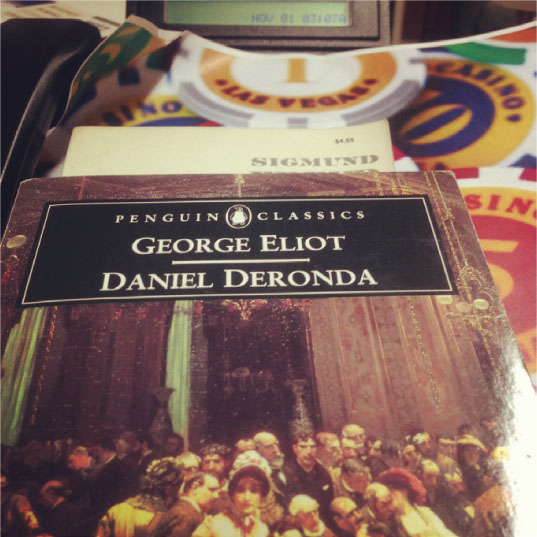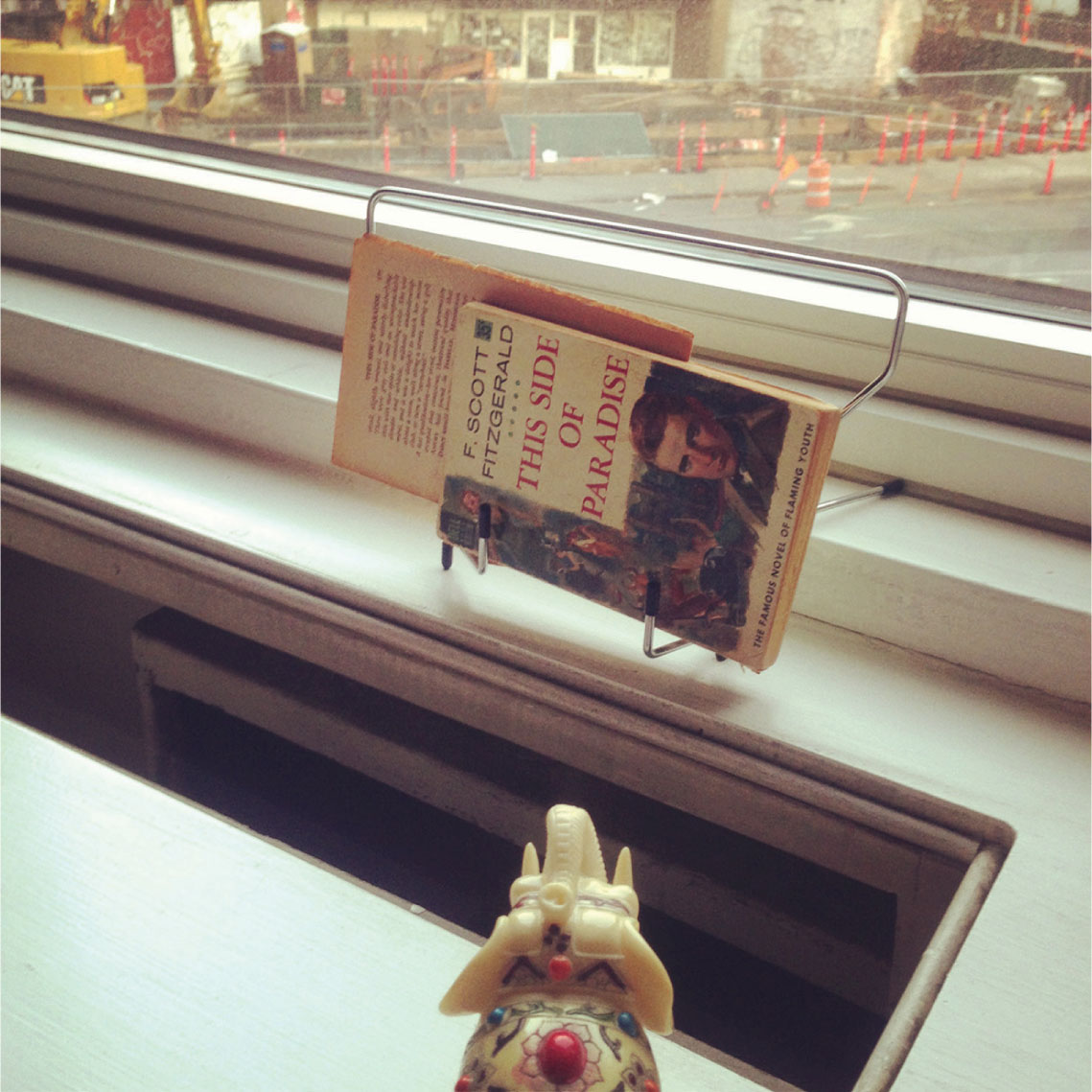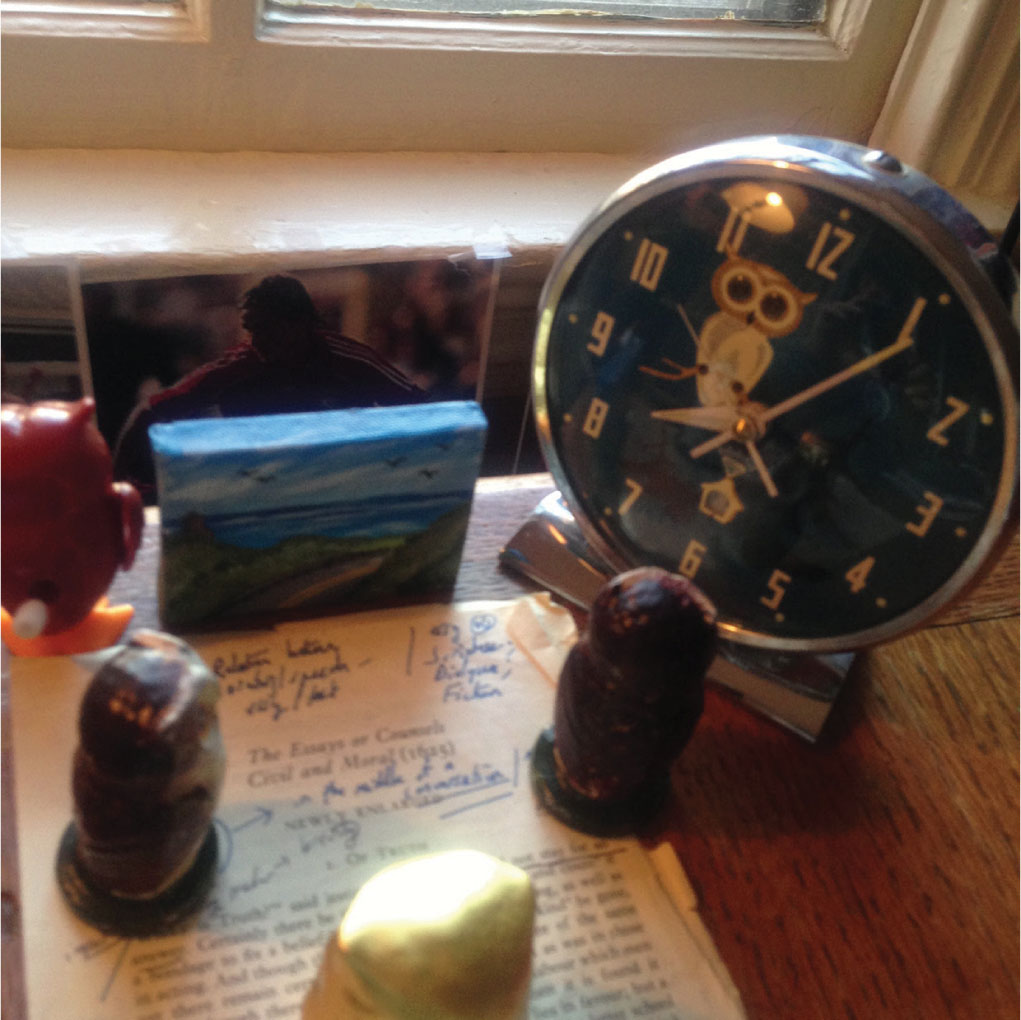4245. This Side of the Dark Side
The conscious person is continuous with a wider
self through which saving experiences come.
William James, The Varieties of Religious Experience
November 1, 2012, at 3:18am
What happens in Vegas may stay in Vegas, but lately I’ve been thinking that the only games worth playing are the ones where what you lose and what you gain can spread some savings across state lines; spread into counties of consciousness; spread a little wealth there, at least a little further than any eye can foresee.
Note: “All my pretty ones” (Shakespeare, Macbeth).

Sweet words are like honey: a little may refresh,
but too much gluts the stomach.
Anne Bradstreet
But how much is too much?—that’s my question. I tend to err on the side of Excess: I know I talk too much, especially when I’m not sure about the reception. And lately, I’ve noticed, I can’t figure out how and from where I receive half the things I say.
All I know is that I feel like I get a lot of calls that need to be returned or relayed.
And I’ve gotten mostly okay with that—mostly okay with all these comings and goings having their way through me, on their way to you.
I guess one mood’s hopeless media is another mood’s hope to meet.
Note:
If this
Be but a vain belief, yet … How oft, in spirit, have I turned to thee (Wordsworth, “Tintern Abbey”).
She loves shocking stories: she has that coarse streak that usually
goes with natures that are both fine and big. She wants people
to like her, but if they do not it never worries or changes her.
F. Scott Fitzgerald, This Side of Paradise
Often I wake in the dark to the thought of things I wish I hadn’t said: the thought of someone shocked into silence, rather than brought to his senses. By the light of this dark, my coarse streak looks a mile wide and nowhere near fine: only an addicted, addled, roundabout garrulousness that can’t resist the temptation of taking up too much space with too many hurled, hurtling syllables.
I lie in the dark and worry that people I like or wish I liked have come to dislike me, and for good reason, given all the things I’ve said.
This worry (older and younger than me, I know; older and younger than any Stop or Street I’ve known) has changed me some over the years. I hope it has changed me for the better and not for the worse.
Either way, it’s morning now, light enough for anyone this tattered side of paradise to start looking for ways to bind together what words have drawn apart.
Note: “Life only avails, not the having lived” (Emerson, “Nature”).

4258. The Care and Loving of a Gift
“She’s folded up in silver paper, you see, as if she was
wrapped from head to foot in new Bank notes. Take care
of her, and there’s my hand, and thank you again.”
“I’ll take more care of her than if she was a gold
image,” said Sloppy, “and there’s both my hands,
Miss, and I’ll soon come back again.”
Dickens, Our Mutual Friend
They march along or move within you, but they never really shed their silver wrapping. No matter how much you lay your hands on them, you never really get the best gifts that you get. You lose them all the time (their movements are a mystery to you; they tend to go off on their own), but soon enough they make their way back to you again—one way or another. (Even my disastrous losses—a sterling-silver token of Adlai Stevenson’s campaign, given by a Loyalist, and stolen from my mother’s house; Welsh love spoons from the collection of a curious, dead uncle of someone I was once with, complete with an inscription no one will ever read—come back to me in dreams.)
If that’s not an allegory for the best reunion ever, I don’t know what is.
Note: “Such things please us best which are most strange, and come farthest off” (Robert Burton, The Anatomy of Melancholy; qtd. by Angus Fletcher, Allegory: The Theory of a Symbolic Mode).
4260. “your whole peculiar plot”
The self and the earth—your thoughts, your feelings,
Your beliefs and disbeliefs, your whole peculiar plot
Wallace Stevens, “An Old Man Asleep”
Half asleep and halfway old, your whole peculiar plot starts to halfway write itself. That’s when you halfway know that it’s not really whole and not only yours.
Note: “I wanted to speak to you here, of the nature of these ‘intellectual poems’ ” (György Lukács, “On the Nature and Form of the Essay”).
4261. “What is truth?”
What is truth? said jesting Pilate, and
would not stay for an answer.
Francis Bacon, “Of Truth”
The answer never seems to come on time.
But when it comes, it’s just in time.
Note: “… even so come …” (Charlotte Brontë, Jane Eyre).

Please pardon our irresolution.
4262. Past “the province of literature”
Milton was steeped through and through with classical
literature. … They did not sweeten his naturally disagreeable
temper. … But in the province of literature where their
influence is soonest and most powerfully exerted, they
conferred on him all the benefits which the encomiasts ascribe
to them. The dignity, the sanity … which ennoble Virgil
and the great Greeks … are all to be found in Milton.
A. E. Housman, “Introductory Lecture,” delivered
before the Faculties of Arts and Laws and of Science,
University College, London, October 3, 1892
You can call it hubris, or you can call it something happier: some of us who know a lot less classical literature than Milton are still hoping to get a little more out of the little we do know of it. Personally, I’m actually hoping that it will, a little, improve my disposition. After all that murder and anger and trying to get back home; all that loving and hating, on the battlefields and bedrooms and the places in-between; all that betrayal and all that trying to be loyal (even under the full weight of a father’s body and the hunger to have the bodies of others), and then, sometimes, buckling at the knees, and falling: all our woe (Milton, Paradise Lost), all of it, and then some—something more—something better: something above and beyond anything that comes from all the parsing out of winning from losing; homecoming from wandering; founding from finishing; Falling from Rising; having, from having not. There’s plenty to learn from those separations, of course. They’re all there, in the Classic Style; all there, in black and white and black and blue all over. But maybe something more confusing (and thus clarifying) dwells amongst those bowers and battalions as well: maybe something else lurks above and below all those mortal differences, something strange and sweet, ready to teach us to forget, for a while, our differences; something ready to receive us (at least in some comparative language of compassion into which we might translate and receive it); some language of compassion, like what awaits a warrior come home to a place that knows him by his real name. Can anyone ever really acquire such a grammar of confusion? I hope so. But if so,
Note: “still more is demanded of us” (Ernst Robert Curtius, “The Personnel of the Comedia,” European Literature and the Latin Middle Ages).
4267. “I’ll come and see you again, as soon as I can”
I may be gone for a good while; but I’ll come
and see you again, as soon as I can.
J.R.R. Tolkien, The Fellowship of the Ring
Someone who’s been helping you out and whom you expected to stay for a while (maybe forever) abruptly announces his immediate departure for parts unknown. Why he’s going is bigger than the both of you—too big for him to say; too big for you to see. He says he’ll be back, but he doesn’t say when.
That sucks.
But then you remember something that makes his sudden leaving a little easier. He’s been a help to you because he keeps his word to you. So you figure, if says he’ll be back, he’ll be back.
And then you go about your business. You’ve done the best you can to trust one for the team.
Note: “Being is the most intelligible and at the same time concealment” (Heidegger, Basic Concepts).
4269. “He … gave me clues to keep me afloat in the conversational stream”
From the moment we fell in love he knew instinctively how to help
me cover my blank spots. … He had a clear, resonant voice. He
never seemed to raise it, and I always heard what he said; at least
he let me think I did. When we were with other people he watched
to see how I was doing and when I floundered he unobtrusively
gave me clues to keep me afloat in the conversational stream.
qtd. by Erving Goffman, from Stigma: Notes
on the Management of Spoiled Identity
I hope this doesn’t sound like some ancient history: a husband helping his wife seem like she’s swimming along in conversations, even though it’s hard for her to hear them (she’d have sunk otherwise).
He’s gone now.
Maybe she’s learned to look like she’s keeping up with the flow, without him. Or maybe she’s found friends (lifeguards and swim instructors of various kinds) who have taught her the strokes she needs to mark her own way across even the coldest channels.
Yesterday’s “wide water, without sound” (Wallace Stevens, “Sunday Morning”) could turn on to today’s current of connectivity.
All it needs is a little lining.
Note: “Whispers antiphonal in azure swing” (Hart Crane, “Atlantis,” The Bridge)
4270. “poor Marcus Aurelius”
Poor Marcus Aurelius is obliged to write pages
and pages in order to be able to find the inner
disposition that he should normally have.
Pierre Hadot, “Philosophy as Life and as a Quest for Wisdom”
All I can say is I know how he feels. There’s this great Closer-Scene in a movie called Say Anything, with John Cusack on a plane with his girlfriend, coaxing her to calmness as they’re taking off (she’s afraid of flying—she’s afraid of most things). So there he is sitting next to her, talking softly to her, telling her that once the light indicating that passengers are free to unbuckle goes on, it’ll all be good. He keeps repeating this to her (with variations), as the wings go up, and we reach our cruising altitude; he keeps talking and talking until the light goes on and, in the same flash and click, the movie ends.
So here we are sitting on this weirdly dimensioned Plane together. We’re a little scared. (We’re a little scared of most things.) And maybe we’re talking too much (we’re talking a lot, that’s for sure), waiting to lift off or fall asleep. Then maybe someone else sitting near enough to us to say something, says something (it could be anything), and it’s just enough flash and click, no matter the vision and volume of the Tumult that sets and besets us, to release us. Then there we are! (Henry James, The Ambassadors)—Both parties …
Note:
swore to terms of peace
set by their arbiter, Athena, daughter
of Zeus who bears the stormcloud as a shield—
Though she still kept the form and voice of Mentor.
(The Odyssey last lines, trans. Robert Fitzgerald)
